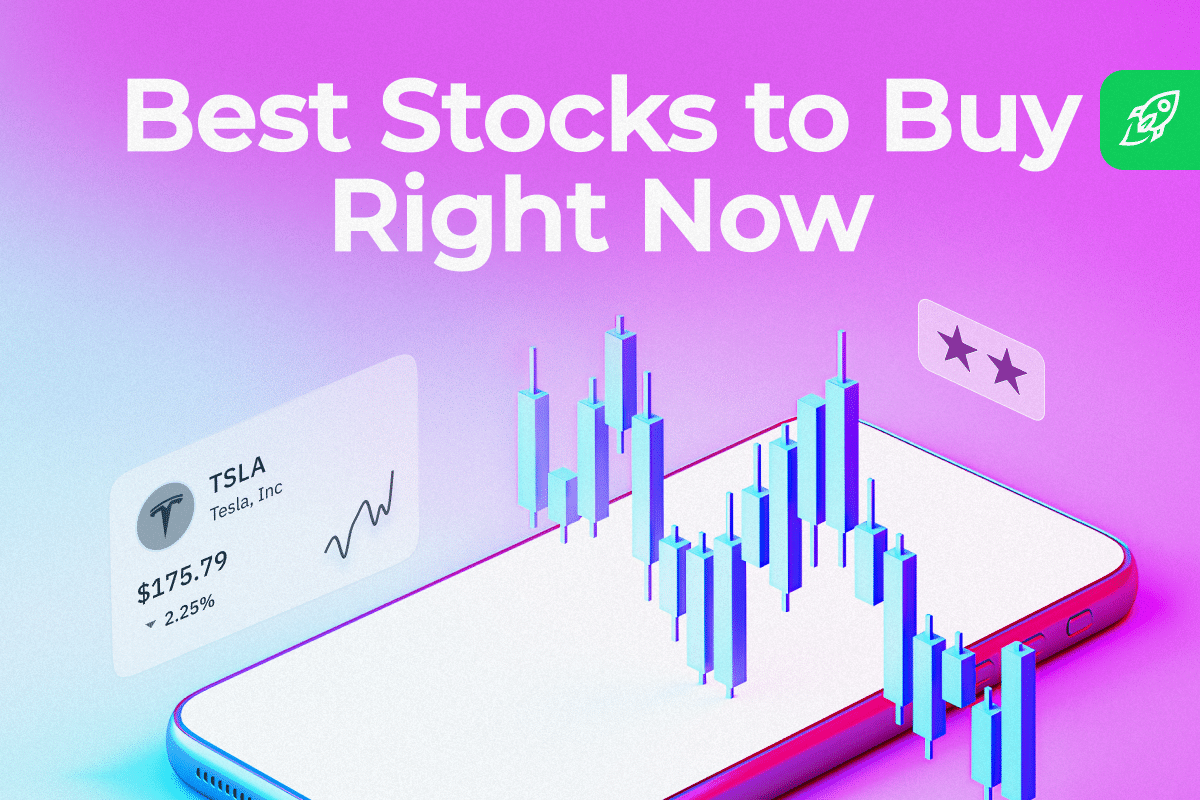Are you on the lookout for high-quality stocks that promise not only a stable store of value but also significant economic growth? The best stocks to buy now are not confined to a single sector; instead, they cover a diversified range of industries, each distinguished by unique factors that make them particularly appealing to those looking to enhance their portfolios.
The selections in this article are based on a mixture of current market conditions and stock prices, future growth potential, and industry-specific trends. Each company has its reasons for being considered a top pick, from technological innovations and market dominance to strategic positioning within high-growth areas. Investors are advised to consider their investment goals, risk tolerance, and the broader market environment when evaluating these opportunities.
Please note that this article does not constitute investment advice and is intended for educational purposes only.
Amazon.com, Inc. (AMZN)
Amazon.com, Inc. is a beacon for risk-tolerant investors, sporting a colossal market capitalization and demonstrating resilience amidst fluctuating market conditions. Known for its dominance in the e-commerce arena, Amazon has revolutionized the way we shop, offering everything from daily essentials to high-end electronics under one virtual roof.
The company’s cloud computing arm, Amazon Web Services (AWS), makes it an even more attractive investment as its innovative technologies serve a wide array of customers from startups to established enterprises with scalable cloud solutions.
Despite experiencing some lows, Amazon’s comprehensive growth strategy, global reach, and innovation in logistics and technology position it as a potential candidate for a rebound, appealing to investors eyeing long-term gains.
Alphabet Inc (GOOGL)
Alphabet Inc., the parent company of Google, has always been a pillar of innovation and growth in the tech sector. Its wide-ranging influence spans search engines, digital advertising, cloud computing, and a plethora of other tech ventures, including pioneering work in artificial intelligence and autonomous driving through Waymo.
Alphabet’s resilience to economic downturns, coupled with its consistent push for breakthroughs in technology, makes it an attractive prospect for those seeking sustained long-term growth. Its commitment to expanding the boundaries of technology and maintaining a dominant presence in various digital markets underlines its potential as a growth-focused investment.
Meta Platforms Inc (META)
Meta Platforms Inc., formerly known as Facebook, remains a strong contender in the growth investment category despite facing various challenges. The company has shown remarkable revenue and earnings per share (EPS) growth over the years, cementing its status as a major player in social media and digital advertising.
Meta’s strategic pivot towards building the metaverse — an immersive digital experience that promises to redefine online interaction — signals its ambition to lead the next generation of internet evolution. Although the metaverse itself wasn’t a successful venture, META remained strong in spite of that failed investment and, what’s more important, has shown its commitment to developing new technologies.
Intuit (INTU)
Intuit, the company behind TurboTax, QuickBooks, and Mint, has become synonymous with financial and accounting software for consumers, small businesses, and accountants. The shift towards remote work has only heightened the necessity and demand for Intuit’s offerings, as more individuals and businesses navigate the complexities of digital financial management.
Intuit’s sustained focus on innovation, customer-centric products, and a robust ecosystem of financial solutions underscore its potential as a long-term investment, particularly as digital financial services continue to evolve and expand.
Nvidia (NVDA)
Nvidia has emerged as a cornerstone of the tech industry, thanks to its pioneering work in graphics processing units (GPUs) for gaming and professional markets, as well as its strategic expansion into AI, deep learning, and autonomous vehicles. The company’s GPUs are critical for a range of applications from gaming to cloud computing, positioning Nvidia at the heart of several key technology trends. Despite market volatility, Nvidia’s role in supporting the growth of the gaming industry and its potential contributions to the burgeoning fields of AI and autonomous technology make it a compelling choice for investors eyeing the tech sector’s future directions.
Intuitive Surgical, Inc. (ISRG)
Intuitive Surgical stands at the forefront of medical innovation with its da Vinci surgical systems, which have revolutionized minimally invasive surgeries. In March 2024, the company announced the fifth generation of the da Vinci robotic system. Its commitment to enhancing surgical efficacy and patient recovery through robotic-assisted surgery underscores its leadership in the medical technology field.
With an increasing global demand for minimally invasive procedures, Intuitive Surgical’s pioneering technology, extensive patent portfolio, and ongoing investment in research and development position it as a key player in the future of the healthcare field.
UnitedHealth Group Incorporated (UNH)
UnitedHealth Group is another titan in the healthcare industry, offering a wide range of services through its UnitedHealthcare and Optum brands. The company’s ability to adjust pricing in response to medical cost inflation, coupled with its focus on value-based care, are only some of the factors that highlight its strategic approach to healthcare management.
UnitedHealth’s diversified services and commitment to innovation and efficiency in healthcare delivery suggest strong growth potential, making it an attractive option for investors looking for stability and growth in the healthcare sector.
Advanced Micro Devices, Inc. (AMD)
Advanced Micro Devices is one of the market leaders in the semiconductor industry with its competitive CPU and GPU products, capable of challenging even long-established rivals like Intel. AMD’s focus on high-performance computing, gaming, and data centers, along with strategic investments in artificial intelligence and the gaming industry, has positioned the company as a leader in the next wave of technological advancements.
AMD’s ability to capture market share and push the boundaries of semiconductor technology has not only fueled its growth but also made it a key player in driving forward the capabilities of computers and digital devices. With the ongoing demand for more powerful and efficient computing solutions, AMD is well-placed to capitalize on the trends shaping the future of technology, offering a promising avenue for investors interested in the semiconductor sector.
Tencent Holdings (TCEHY)
Tencent Holdings is one of the largest and most diversified internet service providers in the world, with significant investments in social networking, gaming, entertainment, cloud computing, and more. As a leading company in China’s rapidly expanding digital economy, Tencent’s portfolio of products and services, including the popular WeChat app, plays an essential role in the daily lives of billions of users.
The company’s strategic investments in various sectors and its ability to innovate and adapt to changing consumer preferences have cemented its position as a powerhouse in the global tech landscape. Despite facing regulatory challenges and market volatility, Tencent’s robust business model, vast user base, and ongoing expansion into new territories and technologies make it an intriguing option for investors looking for international stocks with growth potential.
Bonus: Exchange-Traded Funds
When trying to navigate the entire stock market, exchange-traded funds (ETFs) can be a great investment option for those aiming to diversify their portfolios while tapping into the growth potential of several different companies and even industries. ETFs allow investors to purchase a broad spectrum of stocks in a single transaction, offering a blend of blue-chip stocks, companies with competitive advantages, and those exhibiting robust growth in sales. This diversified approach mitigates the risks associated with heavy investment in individual stocks and aligns well with strategies targeting steady growth, such as those tracking the performance of the S&P 500 or other significant indexes.
Given the fluid nature of the market, ETFs afford investors the flexibility to adjust their holdings in response to shifts in economic indicators, such as elevated interest rates, without the need to set a new price target for every trading day.
However, like all investment strategies, ETFs come with their own set of pros and cons:
Pros:
Diversification: Spreads risk across a range of sectors and companies.
Cost-Effective: Generally lower fees than when buying individual stocks.
Flexibility: Trades like a stock on the exchange, allowing for buying and selling throughout the trading day.
Cons:
Over-diversification: May dilute the impact of high performers on the overall portfolio performance.
Lack of Control: Investors cannot choose the individual components of the ETF.
Potential for Lower Returns: Broad exposure may result in lower returns compared to carefully selected individual stocks.
Some notable examples of ETFs that have garnered attention for their strategic composition and alignment with market trends include the SPDR S&P 500 ETF Trust (SPY), which mirrors the performance of the S&P 500 Index, and the Vanguard Growth ETF (VUG), focusing on companies with high growth potential.
FAQ: Best Stocks to Buy Now
How to find stocks to buy?
Finding stocks to buy often involves a thorough analysis of undervalued stocks with strong competitive advantages and promising growth profiles. Investors tend to look for companies trading below their intrinsic value, indicated by attractive price targets, low flow ratios, and favorable book ratios.
Following financial news, analyses from reputable banks like Bank of America, and reports on Federal Reserve policies can provide insights into market dynamics and potential investment opportunities. Each company’s unique position—from innovation and market dominance to strategic growth areas—should be considered alongside individual investment goals and market conditions.
Where can I buy stocks?
You can buy stocks through brokerage accounts, which are readily available via online platforms or traditional broker-dealer firms. These platforms offer access to a wide array of stocks, including those listed on major exchanges. Setting up an account requires some personal information and, typically, a financial deposit.
Once an account is established, investors can utilize tools and resources provided by these platforms, such as price targets and flow ratios, to make informed decisions. It’s important to choose a brokerage that aligns with your investment strategy, whether it focuses on undervalued stocks, growth profiles, or specific sectors.
What are the best AI stocks to buy now?
The best AI stocks to buy now are those positioned at the forefront of technological innovation with strong competitive advantages and growth profiles. Look for firms with significant investments in AI research and development, partnerships with key industries, and products or services integrated into essential markets. These companies are likely to outperform in their respective fields due to their innovative edge and strategic market positioning. You can also see our overview of the best AI stocks to buy now here.
What is the S&P 500?
The S&P 500 is a stock market index that measures the stock performance of 500 of the largest companies listed on stock exchanges in the United States. It’s widely regarded as one of the best single gauges for the U.S. equity market. The index is weighted by market capitalization, and the inclusion of companies is determined by several factors, including market cap, liquidity, and sector representation. The S&P 500’s composition reflects significant sectors of the economy, offering investors insights into the broader market environment’s health and trends.
Disclaimer: Please note that the contents of this article are not financial or investing advice. The information provided in this article is the author’s opinion only and should not be considered as offering trading or investing recommendations. We do not make any warranties about the completeness, reliability and accuracy of this information. The cryptocurrency market suffers from high volatility and occasional arbitrary movements. Any investor, trader, or regular crypto users should research multiple viewpoints and be familiar with all local regulations before committing to an investment.



